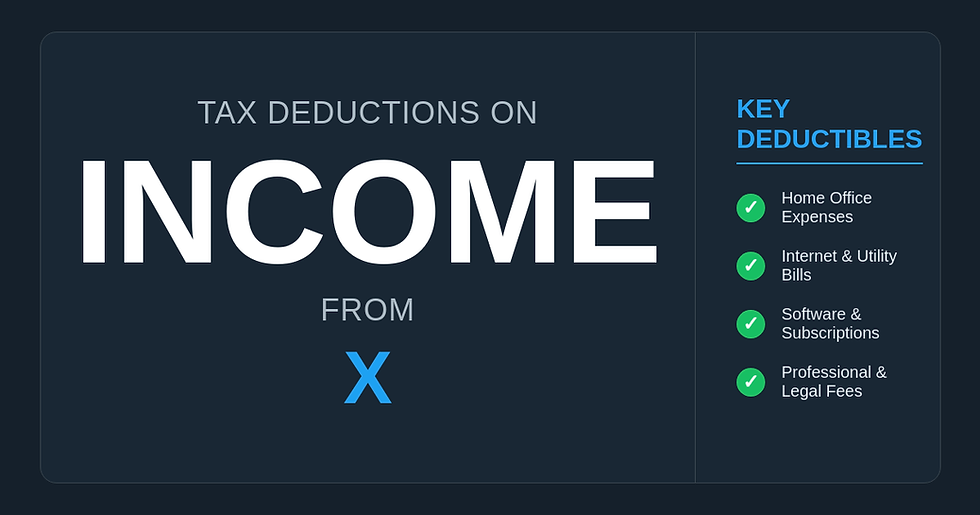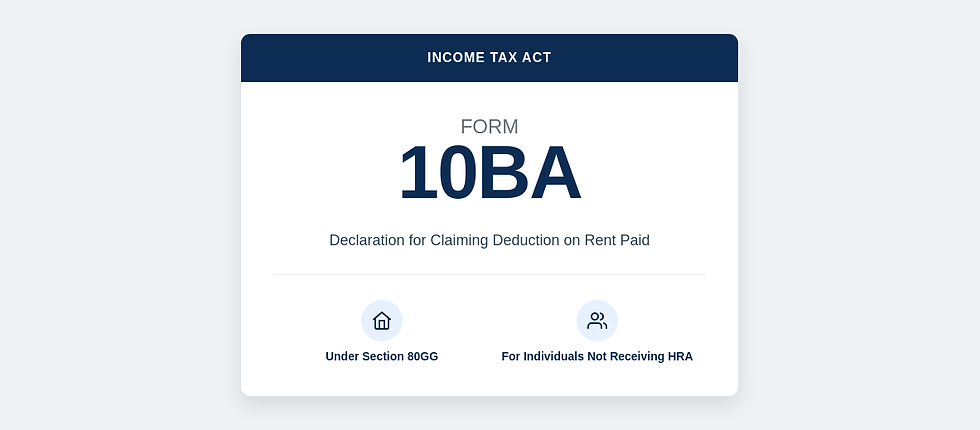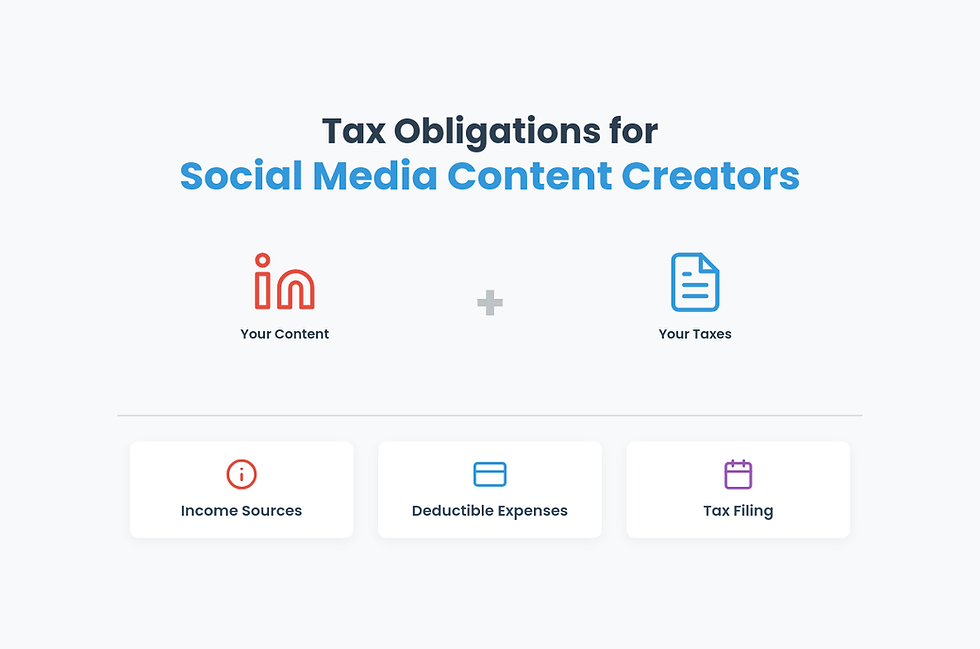Tax on Twitter (X) Income
- Rashmita Choudhary

- 5 hours ago
- 7 min read
Recently, Twitter began sharing a portion of its ad earnings with its well-known users. It is compensated according to the amount of interaction that users produce. Elon Musk recently stated that X Premium (Blue) users would get a portion of the company's profits. Additionally, the microblogging site X, formerly known as Twitter, decided to give its subscribers a cut of the money it made from advertisements. The program's name comes from the fact that it rewards content producers who publish interesting content with a portion of X's advertising profits. According to X, it is now "easier" for content creators to earn money.
Table of Contents
Taxation of Content Creators' Earnings from Twitter (X)
Musk just announced that members of X Premium (blue) are entitled to a share of the business. Another significant statement regarding this microblogging social media site was made by the officials. Additionally, the subscribers would receive a piece of the revenue generated by the adverts. X's revenue-sharing program requires content creators to have at least 500 followers and approximately 5 million organic impressions on their posts.
How Does Tax on Twitter (X) Income in India Work
In India, if a person's turnover is more than Rs 20 lakh in a financial year, they are subject to indirect taxation on their Twitter earnings. If a person chooses the old tax regime, direct taxation begins when their total income exceeds Rs 2.5 lakh; if they pick the new tax regime, it exceeds Rs 3 lakh. A content creator is required to pay taxes if they get this sum from Twitter.
But there are a few important considerations:
Content producers and influencers who work hard to create material for X are required to classify their earnings from X as "business income" or "profits and gains from business or profession."
Any other individual who receives compensation from X but whose posts are less regular or organised than those of professional creators would have their earnings classified as "other income."
How creators interact with the platform determines a lot of factors. People must file Income Tax Returns (ITRs) for either of the situations, which is a crucial consideration. In the two situations outlined above, the creator may request a deduction if they have incurred any costs during the content creation process. People can lower their marketing, travel, and content development subscription costs as a result. It should be mentioned that if gross receipts for the fiscal year surpass the Rs. 50 lakh or Rs. 75 lakh limit, section 44AB for audit is also applicable. The requirement that 95% of the receipts be made online applies to the enhanced maximum of Rs. 75 lakh. It is also possible to apply other pertinent parts of the Income Tax Act, such as section 44ADA.
Every individual who makes money on Twitter, YouTube, Instagram, or any other social media platform is required to report their income source and total income for the year. They must also file their ITR for the relevant financial year by the deadline, which is July 31 for non-audit cases or October 31 for audit cases.
Calculation of Tax on Income from X
Content creators' income tax slab rates will be used to determine X's income. As previously stated, taxpayers are also entitled to deductions if the income is classified as "business income" or "profits and gains from business and profession." The following procedures can assist you, as a content creator, in determining the tax that will be due on your earnings from X:
Step 1: Determine what your "Total Income" is: Total your earnings from X plus any additional sources that may be relevant.
Step 2: Take into account the "deductible expenses: Think about the costs associated with creating content for the social media network. Subtract the specified sum from your "total income."
Step 3: Determine your gross total income. It is the sum left over after subtracting your costs.
Step 4: Evaluate the deductions: Take out the applicable Section 80C and Section 80D deductions.
Step 5: Take into account the taxable income: You will receive your taxable income once you have completed all the previously outlined stages.
Step 6: Examine the tax slabs: Confirm the tax rate according to the income tax slab for your income.
Step 7: Proceed with the tax computation: Multiply your taxable income by the applicable tax rate.
Step 8: Verify if you qualify for tax credits or refunds: Take into account any tax breaks or credits. Your tax burden will decrease as a result.
Step 9: Add cess for education and health: Add a 4% health and education cess after deducting any relevant rebates.
Step 10: Determine the total amount of tax due: The total amount that must be paid in taxes is determined by adding the cess to the tax. Lastly, remember to confirm if TDS would be relevant.
Applicability of GST on Income from Twitter (X)
Social media content producers need to keep in mind that they are required to register and file for GST if their income surpasses Rs 20 lakh in a fiscal year. Influencers' content production services are classified as Online Information and Database Access or Retrieval Services (OIDAR). There will be an 18% GST charge. According to tax experts, the creators' revenue from Twitter India or its international branches determines how much they are taxed under the GST. In the latter scenario, the revenue generated by creators would be seen as a service export. Despite this, content producers are still required to register for GST. Additionally, they must possess a current Letter of Undertaking (LoU). If there isn't a LoU, what should be done? In this instance, the service export has to be done with the integrated tax paid. Refunds are available for these taxes.
Deductions on Income from Twitter (X)

If the expenses are related to content production for X, content creators should consider the deductions they are eligible for:
Internet costs
Computers, cameras, microphones, and other equipment depreciation
Interest on loans taken out to purchase laptops, PCs, and other devices
The team members' salaries
Any administrative costs
Conclusion
In conclusion, X influencers and producers need to be aware of the tax laws governing earnings from producing social media material. Professionals' earnings would be classified as "Profits and Gains from Business and Profession." However, it would be considered "income from other sources" if salaried people received money from X. When filing an ITR, the specifics of such income must be stated explicitly. Additionally, they must register for GST if their income from X is above Rs 20 lakh in a fiscal year.
Frequently Asked Questions
What is the income tax rate for earnings earned from social media?
Earnings from social media platforms are not subject to a particular income tax rate. All of these earnings must be recorded under the correct income category. They will then be taxed at the rates of the applicable income tax slab after any applicable deductions have been applied.
How can salaried individuals report their income from Twitter in the ITR?
As previously stated, salaried individuals who get income from X must likewise disclose it on their ITR. Depending on the situation, they would have to list the specifics under the heading of "Profit and Gain from Business or Professional" or "Income from Other Sources."
What is the Head of Income for people earning from Twitter?
Content creators and influencers, for example, who work diligently to create content for Twitter and other media, would classify their tweet revenue as business income. Income received by other individuals would be subject to 'Other Income' taxation.
Is Tax Deducted at Source (TDS) applicable on income from social media?
TDS would be imposed regardless of whether the payment was made by the social media company's foreign or Indian business. According to Section 194J of the Income Tax Act of 1961, TDS would be deducted if the payment was made by an Indian corporation. If the total amount paid exceeds Rs 30,000, 10% tax will be subtracted. Depending on the regulations of the country, TDS may be payable if the revenue was obtained from a foreign organisation. It is necessary to verify whether the tax credit is available for taxes withheld from sources outside of India by consulting the Double Taxation Avoidance Agreement (DTAA).
How to report income from social media in ITR?
The income must be reported on the ITR form, depending on whether the revenue is paid by an Indian or foreign entity. It is crucial for ITR purposes to know the payment's dispatch location. Payments from foreign companies are considered foreign income, and regardless of the standard exemption level, the recipient must submit an ITR. There is no idea of foreign income or schedule FA if the payment is made through an Indian subsidiary because the source and receiver are both in India. It is recommended that you study the messages you receive from social media firms in order to comprehend the location of service, which determines the differences in tax disclosures.
Do I need to pay tax on X (Twitter) ad revenue received from abroad?
Yes. Income earned globally by Indian residents — including from Twitter’s revenue-sharing — is taxable and must be declared in your ITR under "Income from Business or Profession" or “Other Sources”.
Will X send me a Form 16 or 16A for tax filing?
No. Twitter does not deduct TDS or provide Form 16/16A. You must track and report this income voluntarily, often with the help of your payment gateway records.
How do I account for income received via Stripe/Payoneer from X?
All such income must be converted into INR using RBI reference rates and reported as foreign income. You may also need to fill out Schedule FSI or FA if threshold limits are met.
What ITR form should a creator use to report Twitter income?
ITR-3 is applicable for most content creators and professionals. ITR-4 may be used if income is under presumptive taxation (Section 44ADA) and meets conditions.
Are Twitter Super Follows or paid subscriptions taxable?
Yes. These are taxable as income and must be declared. If annual income exceeds ₹20 lakh, you may also need to register under GST.
Is TDS applicable on income from Twitter?
Not directly, as Twitter pays creators without deducting TDS. But if Indian brands pay influencers via collaborations on X, TDS under Section 194C or 194J may apply.
Do Indian tax laws classify Twitter income as business or freelance income?
If you consistently create content for monetization, it's considered business/professional income, not casual income.
Can digital expenses be deducted from Twitter income?
Yes. Expenses like software tools, video editing subscriptions, internet bills, or office setup may be claimed as business expenses if properly documented.
Is GST applicable on Twitter monetization income?
If your annual income exceeds ₹20 lakh (₹10 lakh in some states), you may be liable to register for GST even for digital services, unless exempt.
Can I use Section 44ADA for Twitter income?
Possibly, if your profession falls under eligible notified professions and gross receipts are under ₹50 lakh. Presumptive income will be considered at 50%.













Comments